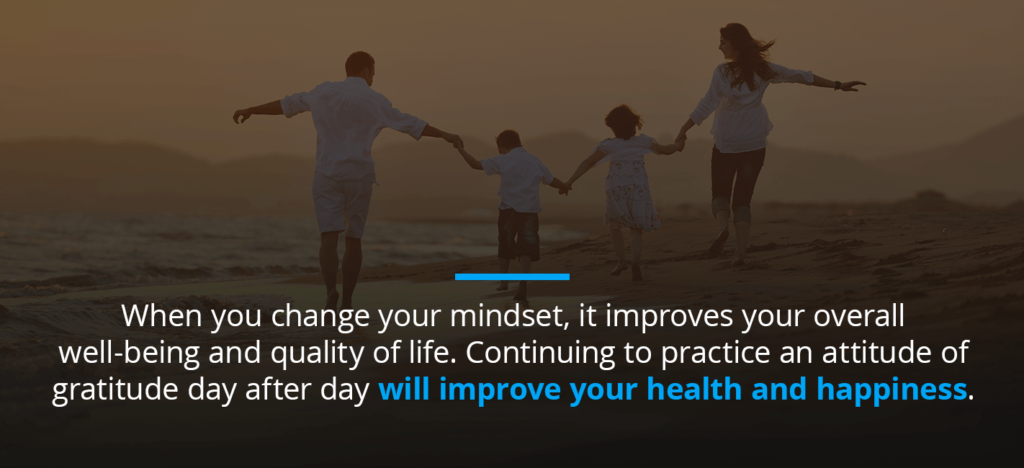While saying “thank you” is often expected in certain situations, gratitude goes beyond just saying those simple words. Gratitude is a feeling of being deeply grateful and appreciative for all of the good things in life — whether it be a person, pet, situation or more. This emotion can lead to longer-lasting feelings of contentment and positivity, changing your life in significant ways.
What Is an Attitude of Gratitude?
Practicing gratitude doesn’t always come naturally. While it may be easy to feel thankful when things are going right, having an attitude of gratitude involves continuing to look for the good things in life even when things seem to be going wrong. You might find that sometimes this feeling comes easily and spontaneously, while other times it takes a lot more work to feel grateful. This practice can involve a great deal of conscious effort to look beyond any setbacks, feelings of fear, hopelessness and disappointment, especially in the beginning. The more you decide to embrace the feeling of gratitude, the sooner it will develop into a daily habit. You’ll learn how to see and interact with the world in a new way and discover that there are always endless things to be grateful for. You’ll find that practicing gratitude often involves two stages:
- Acknowledge and affirm the good things in your life that make it valuable and worth living.
- Discover that these good things are often a result of forces outside yourself.
Adopting this attitude of gratitude will enrich and give your life deeper meaning, benefiting you in several ways.
Anxiety and Gratefulness Can’t Coexist
When you choose to be grateful, you’re making a conscious decision to focus more on the positive instead of the negative things in life. Focusing on negativity feeds into feelings of pessimism and anxiety. If you want to reduce these emotions that bring you down and make it difficult to overcome difficulties, try shifting instead to a positive, grateful mindset. In fact, you’ll discover that it’s difficult for anxiety and gratitude to coexist. When you’re looking for positive interactions and situations, you’ll be too busy cultivating a mindset to allow room for anxious thoughts and feelings to gain a foothold. Learn how to appreciate everyday moments and practice gratitude in all areas of your life, from your family and home to friendships and social interactions to your workplace. You can focus on the specific things you’re grateful for and why you appreciate them to make each of these areas less anxiety-inducing and more meaningful and fulfilling.
The Power of Gratitude: Improve Your Mental Health and Happiness

What Are Some Additional Benefits of Gratitude?
The more often you practice gratitude, you’ll begin to see that this habit has limitless benefits. Additional advantages of having an attitude of gratitude include being able to:
- Improve your feelings of well-being.
- Build resilience when anxious or stressed.
- Reshape circumstances into more positive experiences that you can learn and grow from.
- Express more kindness and generosity to individuals in your life and with those you might meet.
- Experience more satisfying and stronger interpersonal relationships.
5 Ways to Adopt an Attitude of Gratitude Into Your Daily Life
Adopting an attitude of gratitude will change your life. Here are five ways you can make gratitude a part of your daily routine:
- Be observant: If you want to be grateful in all circumstances, you’ll need to be observant. There are many small moments each day that you can be thankful for if you just take the time to notice them.
- Count your blessings: Focusing on what you have rather than what you don’t have can help shift your mindset into an attitude of gratitude. You’ll value the relationships and things you have in your life and develop an optimistic outlook instead of waiting for what’s next.
- Keep a daily journal: Keeping a daily journal, whether it’s a physical notebook or on your phone, can help you be intentional about practicing gratitude. Come up with a number, like three or five blessings, and spend some time at the beginning or end of your day reflecting on those things you’re grateful for.
- Express your gratitude: Reflect on the individuals in your life and the positive impact they’ve had on you. Consider family members, friends, neighbors, co-workers, and servicepeople you come in contact with daily. Let them know either in person or over email or text why you’re thankful for them and what they do.
- Encourage others to adopt an attitude of gratitude: Be intentional about sharing how your new mindset has changed your life with those around you. Your environment plays a big role in your life. Negativity can feed negativity while positivity feeds positivity. Surrounding yourself with individuals who are appreciative and thankful makes embracing your new practice easier.
Learn How to Improve Your Well-Being With Merrimack Valley Psychological Associates
At our counseling center in Andover, Massachusetts, our team of compassionate clinicians is dedicated to helping adults, adolescents, children, and families overcome challenges and improve their well-being and happiness. All of our treatments are clinically tested and approved for use and have demonstrated statistical reliability in treatment. Whatever your goals, you can count on our clinicians to help you reach them with our flexible treatment styles. With teleconference therapy sessions available, receiving help has never been easier. Reach out to Merrimack Valley Psychological Associates today to schedule an appointment with our team.
Reviewed By
Dr. David Rainen, PsyD.
I am a licensed clinical psychologist with an extensive background treating a variety of different ages, situations, emotional and mental health disorders in individuals and their families. As part of my 10 year professional and training career in psychology, I have developed and refined my skills and approaches through my work in a variety of diverse settings including: hospitals, community outpatient facilities, college counseling centers, secure and unsecure inpatient/residential treatment programs, and therapeutic day schools.



